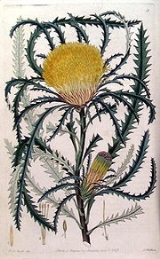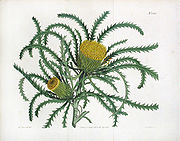
Banksia prolata
Encyclopedia
Banksia prolata is a shrub
endemic to Western Australia
.
It was known as Dryandra longifolia until 2007, when all Dryandra species were transferred to Banksia
by Austin Mast
and Kevin Thiele
. As the name Banksia longifolia had already been published as a nomen nudum
, Mast and Thiele were forced to choose a new specific epithet; their choice, "prolata", is from the Latin
prolatus ("elongate"), in reference to the long, narrow leaves already described by longifolia.

Shrub
A shrub or bush is distinguished from a tree by its multiple stems and shorter height, usually under 5–6 m tall. A large number of plants may become either shrubs or trees, depending on the growing conditions they experience...
endemic to Western Australia
Western Australia
Western Australia is a state of Australia, occupying the entire western third of the Australian continent. It is bounded by the Indian Ocean to the north and west, the Great Australian Bight and Indian Ocean to the south, the Northern Territory to the north-east and South Australia to the south-east...
.
It was known as Dryandra longifolia until 2007, when all Dryandra species were transferred to Banksia
Banksia
Banksia is a genus of around 170 species in the plant family Proteaceae. These Australian wildflowers and popular garden plants are easily recognised by their characteristic flower spikes and fruiting "cones" and heads. When it comes to size, banksias range from prostrate woody shrubs to trees up...
by Austin Mast
Austin Mast
Austin R. Mast is a research botanist. Born in 1972, he obtained a Ph.D. from the University of Wisconsin–Madison in 2000. He is currently an associate professor within the Department of Biological Science at Florida State University , and has been director of FSU's since August 2003.One of his...
and Kevin Thiele
Kevin Thiele
Kevin R. Thiele is curator of the Western Australian Herbarium. His research interests include the systematics of the plant families Proteaceae, Rhamnaceae and Violaceae, and the conservation ecology of grassy woodland ecosystems...
. As the name Banksia longifolia had already been published as a nomen nudum
Nomen nudum
The phrase nomen nudum is a Latin term, meaning "naked name", used in taxonomy...
, Mast and Thiele were forced to choose a new specific epithet; their choice, "prolata", is from the Latin
Latin
Latin is an Italic language originally spoken in Latium and Ancient Rome. It, along with most European languages, is a descendant of the ancient Proto-Indo-European language. Although it is considered a dead language, a number of scholars and members of the Christian clergy speak it fluently, and...
prolatus ("elongate"), in reference to the long, narrow leaves already described by longifolia.


